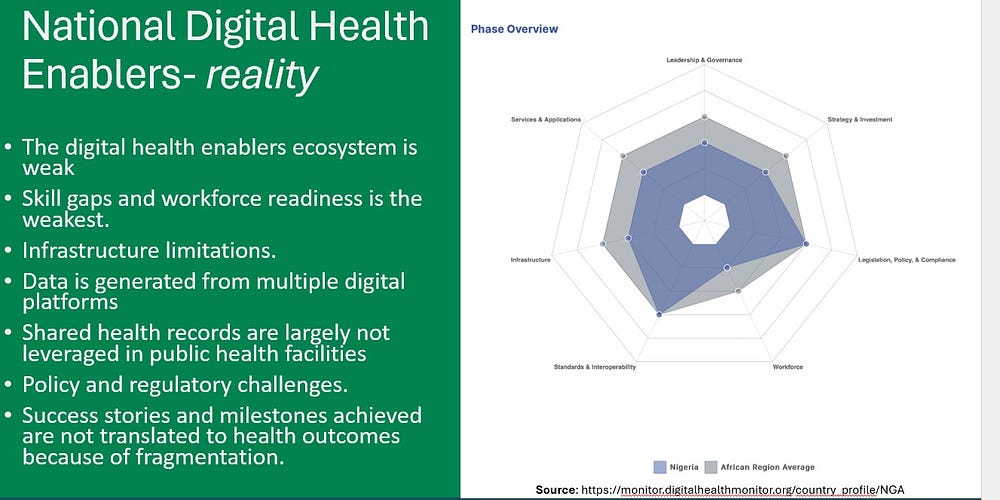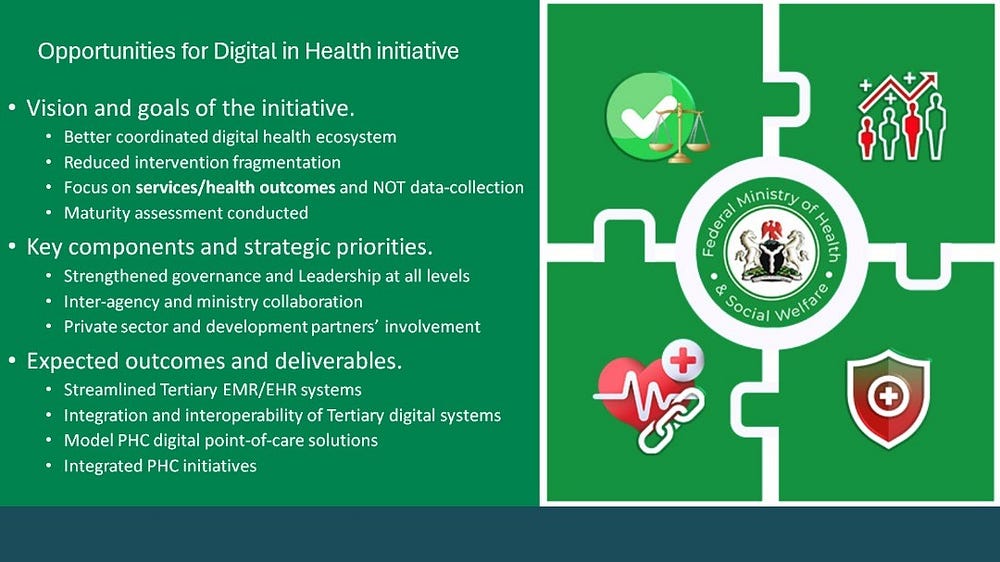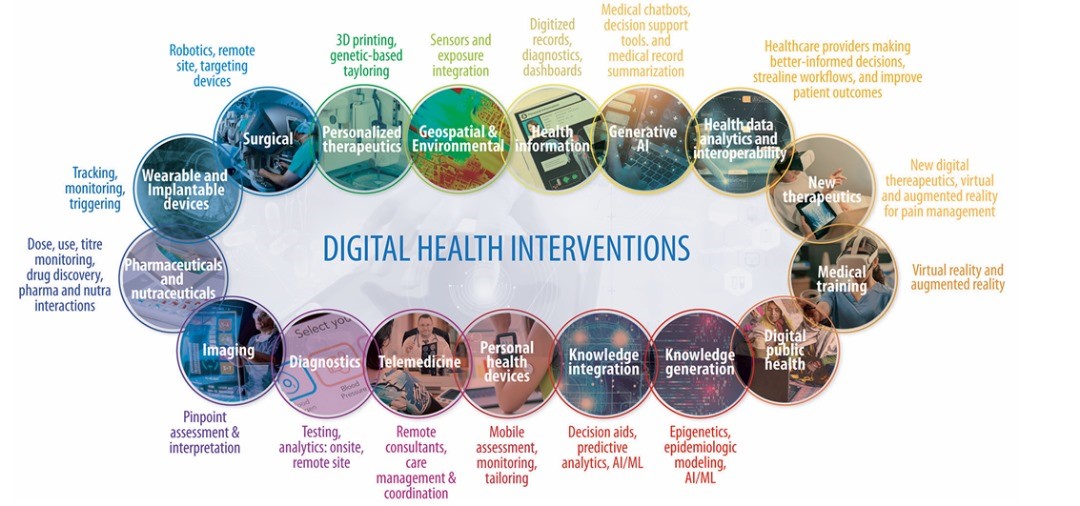Data and technology play a crucial role in the healthcare sector. The advent of technological innovations, including artificial intelligence, telemedicine, and mobile health applications, amongst others signals a future of health care, where healthcare is fundamentally driven by technology and data-linked. This evolution promises a healthcare landscape that is not only more efficient but also more personalized and accessible.
Nigeria, with its vast population and constrained infrastructure, coupled with a shortage of medical professionals will require the adoption of technology solutions as a transformative catalyst to bridge gaps and revolutionise healthcare delivery. Data-driven healthcare empowers physicians through the use of electronic medical records (EMRs), which equips health workers with real-time patient insights. This improvement ensures improved care coordination and reduces the likelihood of errors. This is an important step toward more efficient and effective healthcare services.
Beyond coordination, technology is bridging the accessibility gap, by delivering specialist care to remote areas through telemedicine. By utilising health apps for planned follow-up visits, physicians and patients collaborate more effectively, increasing the likelihood of follow-up, reducing appointment cancellations, and improving patient outcomes. Digital health data provides a comprehensive picture of real-time requirements, ensuring that critical care reaches every Nigerian. On the other hand, physicians can leverage Artificial Intelligence (AI) to analyse patient data and predict drug-drug interactions.
Underutilised potential
The current outlook for digital health in Nigeria appears to be for data reporting, service delivery support, payment system, responsiveness, quality of service, and tracking of services among other things. Gbenga Ijaodola, Programme Manager, Nigeria Digital in Health (NDH) Initiative explained that, despite investments made by the federal government, the private sector and development partner-led initiatives, Nigeria’s health ecosystem remains largely fragmented by disease programme, geographic considerations, funding considerations and more importantly, interventions that are often not fit for purpose.
“Our healthcare system suffers from data fragmentation as only a small number of private institutions and federal institutions use Electronic Medical Record (EMR)/ Electronic Health Record (EHR) platforms to keep track of patient data, promote research, provide treatment, and manage operations and resources. While the majority still rely on rudimentary paper-based methods”, Dr. Tunji Alausa, Honourable Minister of State for Health and Social Welfare added while inaugurating the Implementation Committee for NDH Initiative.

According to the Honourable Minister of State for Health and Social Welfare, despite the existence of the few EMR/EHR platforms, none are standardised to integrate, collect, and manage data across institutions or designed to share patient data simply in real-time. This has resulted in significant quality gaps in the Nigerian healthcare system. “Therefore, the transition to a digital health infrastructure is not merely a choice but a necessity to revolutionise healthcare delivery in our country.” Dr Tunji stated.
The range of digital technologies accessible for health and healthcare in Nigeria is extensive and ever-expanding; nevertheless, much of this potential is yet to be fully utilised in many health facilities.
Addressing shortcomings
Given the dearth of standard data collection and management, the Nigerian healthcare system has faced numerous challenges, limiting the growth of the health industry, and weakening decision-making. This has also resulted in inefficient use of resources, making it difficult to get a comprehensive view of Nigeria’s healthcare environment.
“We want to rebuild and reposition the digital health environment to include data gathering, data repository, data servicing, and service regulation”. Dr Tunji explained. The national unified EMR platform will serve as a central hub to enhance health system efficiency, ensure robust monitoring of public health and disease outbreaks, and mortality rates, facilitate seamless data exchange and quality assurance, and foster opportunities for further research to strengthen our national health security according to Dr Tunji.
“It will also hold our various institutions accountable, and ultimately, allow us to have ownership of our data from the primary to the federal healthcare level for the first time in Nigeria’s history,” Dr. Tunji Alausa explained.
Actualising digital-in-health
It is time to move beyond siloed, fragmented, and piecemeal digital solutions in health. To unlock the value of digital technology for everybody, we must shift our thinking about digital health to a new level. This implies a broader and more integrated way of thinking about digital health investments- digital-in-health.
With patients at the centre, digital in-health is a paradigm in which digital technology and data are seamlessly integrated and assimilated into health systems management, health finance, health service delivery, and public health. In a digital-in-health approach, digital technology and data should be used in all aspects of the health system, including health financing, health service delivery, nutrition, research, pandemic preparedness, public health and prevention of illness, and medical education.

Most importantly, a digital-in-health approach can personalise health services, save costs, put people at the centre to improve equity, improve healthcare delivery, and accelerate public health initiatives.
Marelize Gorgens, Lead, AI for Health, Education, and Social Protection at the World Bank, explained that three tactics are required to achieve a health system empowered by a robust digital-in-health approach that intelligently and systematically integrates and leverages digital across the health landscape:
- Prioritise evidence-based digital investments that tackle the biggest problems and focus on the needs of patients and providers such as addressing the disconnect and gaps in health information and telemedicine.
- Integrate regulatory, governance, information, and infrastructure to ensure that patient data security, and health workers can use digital solutions transparently to deliver better care.
- Scale digital health for the long term by providing sustainable financing for partnerships with and among the private sector, as well as developing capacity and skills for digital solutions that benefit everyone.
It is often said that “data is life” , and the importance of data and technology, particularly in health care, cannot be overstated. Beyond data and information management, the health sector can make use of data and technology in a variety of ways , and the digital-in-health approach is the right step in the right direction. However, it is important for policymakers to recognise the immense potential of data and technology and tap into it, now sooner rather than later.


